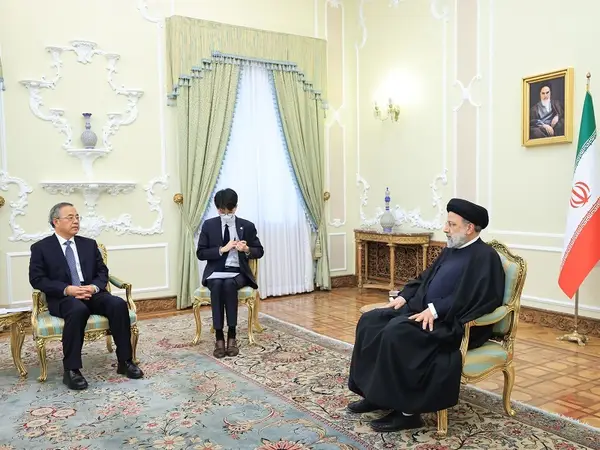While China has undermined Iran’s territorial integrity by signing a Gulf Cooperation Council statement, Tehran has used a mild tone to express its dissatisfaction.
Iran’s President Ebrahim Raisi on Tuesday told China’s Deputy Prime Minister, Hu Chunhua, that the Islamic Republic is “unhappy” about the position of Beijing and expects its ally to make up for it.
However, he emphasized that the visit of the Chinese delegation to Iran is “important” for the development of mutual economic and commercial cooperation.
In a statement last week during the visit of China’s President Xi Jinping to Saudi Arabia, the Gulf Cooperation Council and the Chinese side made a reference to three small islands in the Persian Gulf that Iran took over as its historic territory in 1971 but the United Arab Emirates claims as its own.
The concluding statement of the meeting that was attended by GCC dignitaries as well as Xi Jinping said: “The leaders affirmed their support for all peaceful efforts, including the initiative and endeavors of the United Arab Emirates to reach a peaceful solution to the issue of the three islands; Greater Tunb, Lesser Tunb, and Abu Musa, through bilateral negotiations in accordance with the rules of international law, and to resolve this issue in accordance with international legitimacy.”
Following the United Kingdom’s withdrawal of its forces from the region to give independence to the small Arab littoral Sheikdoms, Iran’s Mohammad Reza Shah decided to take over the Greater and Lesser Tunbs and Abu Mousa. The UAE was just being formed and there was a serious political and military vacuum on the Arab side of the Persian Gulf.
In the wake of China’s stance, many Iranians on social media harshly criticized their government for a major failure. They asked the clerical regime what exactly went wrong that its ally, China acquiesced to such a statement.
Iran’s foreign ministry on Saturday held a meeting with the Chinese envoy to Tehran to express its displeasure about the statement, but unlike the language it uses for Western countries, the foreign ministry did not use the term “summoning” saying the Chinese diplomat was “invited” and refrained from using terms like “protest” or “condemn”.
It said on its website that the envoy “had a visit” with an Iranian official on Saturday, during which Tehran’s “strong dissatisfaction” was expressed.
Regime’s Foreign Minister Hossein Amir-Abdollahian also came under fire after he said in a tweet “the islands are inseparable parts of Iran and are part of the eternal belongings of our motherland. We firmly insist on the need for respecting Iran's territorial integrity.”
Iranians on social media strongly criticized him saying he “did not even dare” to name China, and asking why he has only tweeted in Farsi this time whereas he used to tweet both in Farsi and Chinese to express support for China on Taiwan.
However, it was not the end of the story as China and the Gulf Cooperation Council member states urged for dialogue on Iran’s “destabilizing regional activities” and “support for terrorist and sectarian groups and illegal armed organizations”, as well as its ballistic missiles and drones proliferation.
The statement also emphasized that the peaceful nature of the Iranian nuclear program must be ensured urging the Islamic Republic to fully cooperate with the International Atomic Energy Agency.
Again, Iran’s reaction was so mild when the Foreign Ministry Spokesman Nasser Kanani said it was a “surprise” to see Iran-related clauses in the statement.
Hardliner Kayhan newspaper affiliated with the office of Supreme Leader Ali Khamenei wrote on Sunday, “The expansion of ties between Beijing and Riyadh is more a strategic challenge for the undisputed dominance of the US rather than being a challenge for Iran.” It added that China is entering a region that has always been considered the backyard of Washington.”
The state-run Iran Daily also claimed in its editorial Sunday that China and Russia “have no alternative in their regional policy except Iran” saying relations between Beijing and Arab states “will lead to the realization of the Islamic Republic’s interests.”
However, Nusratullah Tajik, the former ambassador of Iran to Jordan told a website Sunday that “The Chinese have clearly told us they do not agree with our anti-American approaches.”
“We should not rely too much on China as they may use or even misuse Iran's anti-US policy,” he added.
